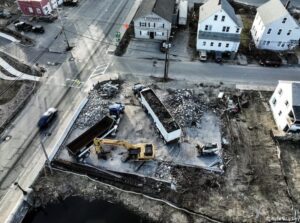Who is a member?
Our members are the local governments of Massachusetts and their elected and appointed leadership.

An auto body shop in Winchendon is being demolished for a park project. (Photo courtesy Winchendon resident Kyle Bradley)
As it converts one distressed property into a small waterfront park and sells another, the town of Winchendon is eyeing a better future for its downtown and the surrounding area.
Within the past two years, the town has acquired two deteriorating, tax-delinquent properties — an old auto body shop and an adjacent two-family home — with plans to sell the house and convert the auto body property into a park along the Millers River watershed. The sale of the home, combined with grant money, is expected to cover the park’s estimated $150,000 cost, said Town Manager Justin Sultzbach.
By this summer, the Worcester County town along the New Hampshire border hopes to have a brand new park, a beautified gateway into downtown, a resolution to a tax problem, and a symbol suggesting that Winchendon’s fortunes are on the rise, as grants and new business investments come into the community of just over 10,000 people.
“It’s infrequent that you can find a project that’s a win-win like that,” Sultzbach said. “Ultimately, it’s not going to cost the taxpayers a dime.”
Sultzbach said the property owner didn’t want the two properties anymore and owed Winchendon about $100,000 in back taxes. So the property owner and the town came up with a potential solution: The owner would give Winchendon the properties in return for tax forgiveness.
Before bringing the deal to a special Town Meeting in the fall of 2021, the town conducted preliminary environmental testing to ensure that the “gift” wouldn’t turn into an environmental headache. The town had been worried about rain that had been seeping through a damaged shed roof and onto old oil barrels, Sultzbach said, but the initial results on the site were encouraging.
“We didn’t want to go to the citizens of Winchendon with a question mark in hand and ask them to take a leap of faith,” Sultzbach said.
Town Meeting approved the deal and turned the property over to the Winchendon Redevelopment Authority. With the shop building now removed, the town is having additional environmental testing done. Officials said they hope to proceed with construction and landscaping, and aim to have the 100-by-100-foot park open this summer.
In April, the town was closing on the two-family house for $120,000, Sultzbach said. To prevent the home from deteriorating further, officials included conditions requiring the new owner to upgrade the property within six months, with improvements including a new roof and new siding.
To finish the park, Sultzbach said, Winchendon is using grant money it acquired from the New York-based Robinson Broadhurst Foundation. The town is also defraying project costs by having its public works department pitch in, he said.
The $150,000 estimated project cost will cover the park basics, including walkways, benches, trees and old-fashioned municipal lights. However, officials are also already envisioning a second phase — the installation of public art and plaques celebrating Winchendon’s manufacturing past. The town is seeking additional grant funding to pay for those elements, Sultzbach said.
Kenneth LaBrack, chair of the redevelopment authority, said that the town’s work on the two properties, and the resulting park, will reinvigorate that part of Winchendon and tie in with a similarly beautified park area nearby.
“We’re eliminating two eyesores, and making Winchendon a lot better place to look at coming into town,” LaBrack said.
The improvements reflect increased investments overall in the town, LaBrack said. Businesses including a cannabis grow facility and a brewery are coming into Winchendon, he said, and officials are looking forward to the June opening of a new amphitheater, built with a $4 million gift from the Robinson Broadhurst Foundation.
“There’s a lot of nice little things happening in town,” LaBrack said, “and we’re hoping the combination of these will start bringing in people, and hopefully they would spend some money in town.”